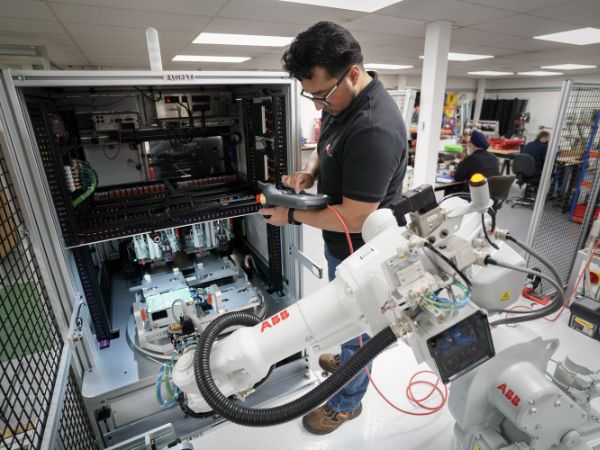We are dedicated to providing automation solutions that not only increase productivity but also ensure the highest standards of quality in automotive electronics. One aspect of maintaining this quality is real-time defect detection throughout the assembly process. By integrating advanced testing and defect detection systems, we help our customers deliver reliable, fault-free products to the market.
The Challenge of Quality Control in Automotive Electronics
Quality control is essential, especially when producing complex electronics such as On-Board Chargers (OBC) and Electronic Power Distribution Units (ePDU). Traditionally, manual assembly processes have relied on post-assembly inspections to identify defects. However, this approach has significant drawbacks. Detecting defects at the final stage often means that errors have already made their way through multiple stages of production, leading to costly rework or, worse, faulty products reaching customers.
As the automotive industry evolves, with increasingly complex electronics becoming essential to vehicle performance, the tolerance for defects has diminished. Even small flaws in these components can result in significant operational failures or safety issues. Therefore, maintaining high standards of quality is not just a competitive advantage—it’s a necessity.
The Role of Real-Time Defect Detection in Preventing Faults
Real-time defect detection allows manufacturers to identify and address issues as they arise during the assembly process. Instead of waiting until the final inspection, automated systems equipped with sensors, cameras, and data analytics continuously monitor each stage of production. This proactive approach ensures that any defects are detected early, preventing defective components from progressing down the assembly line.
This method is particularly important when dealing with highly intricate tasks, such as soldering connections on an ePDU or ensuring the correct adhesive application in an OBC. Automated systems can monitor each step in real-time, detecting deviations from required standards and allowing immediate corrective action. This process not only improves product quality but also reduces waste and rework, significantly cutting down production costs and delays.
The Benefits of Early Detection in Automated Assembly Lines
Real-time defect detection offers a range of benefits, from improving efficiency to enhancing overall product quality.
- Reducing Rework and Scrap: When defects are caught early, manufacturers can avoid the need to disassemble and reassemble components, which saves both time and resources. Automated systems can often correct minor issues on the spot, further streamlining the process.
- Improved Product Reliability: Consistent monitoring during production ensures that each component meets the necessary standards. This is essential for automotive electronics, where even the smallest defect can cause significant malfunctions. Real-time detection reduces the risk of defective products reaching the customer, enhancing the overall reliability of the final product.
- Minimising Downtime: Defects that go undetected until later stages of production often cause extended downtime as engineers work to diagnose and fix the problem. By detecting issues in real time, production can continue with minimal interruptions, keeping the assembly line running smoothly and efficiently.
Technology Enabling Real-Time Defect Detection
The backbone of real-time defect detection is the integration of advanced sensors and vision systems. These technologies, combined with AI-driven analytics, ensure that every detail of the assembly process is scrutinised in real-time. At ALPHR, we design and manufacture systems that perform vision checks, dimensional analysis, and functional tests to ensure that every component meets exacting standards.
By immediately flagging these issues, the system allows operators to address the problem before it affects the overall product quality. In addition, data from these real-time inspections can be collected and analysed to identify patterns, helping manufacturers implement long-term process improvements.
Enhancing Traceability and Accountability
Another advantage of real-time defect detection is enhanced traceability. In highly regulated industries like automotive manufacturing, being able to trace every step of production is essential for quality assurance and compliance. Our systems are equipped with RFID technology that tracks each component through every stage of assembly, creating a complete record of its journey. This level of traceability simplifies root cause analysis if defects are discovered later in the process and allows manufacturers to quickly identify and rectify the source of the issue.
In addition, this data-driven approach creates accountability across the production process. Operators can monitor real-time performance data, ensuring that every aspect of production is within specified parameters. This transparency leads to better decision-making and continuous improvement, which ultimately results in higher-quality products.
Staying Ahead of Industry Demands
Real-time defect detection is no longer a luxury—it is an essential component of modern manufacturing. At ALPHR, we understand that maintaining high-quality standards is essential for our customers to stay competitive in a fast-paced and innovation-driven market.
Our commitment to real-time defect detection ensures that every system we design is equipped to catch defects early, reduce rework, and improve overall efficiency. By investing in advanced automated solutions that prioritise quality at every step, we help manufacturers stay ahead of industry demands while delivering products that meet the highest standards of performance and safety.


